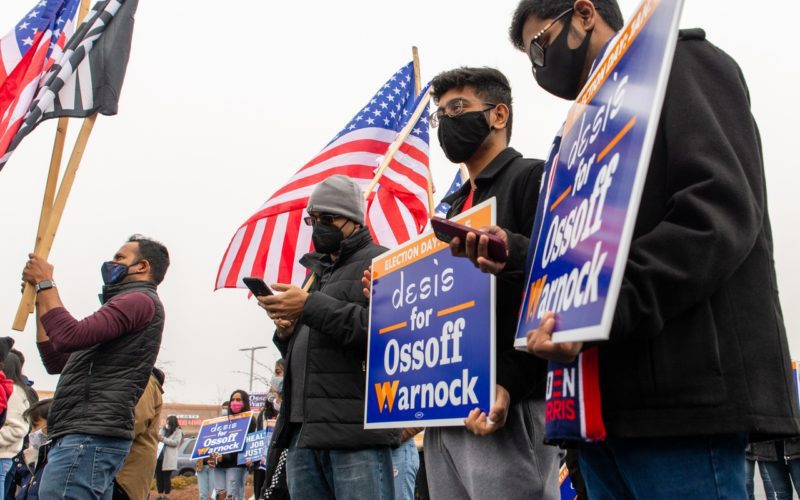Newsletter subscribers get early access to exclusive stories like this one. Sign up here to receive The Yappie‘s weekly briefing on Asian American politics and support our work by making a donation.
YAPPIE EXCLUSIVE—Georgia Democrats are targeting more than 34,000 voters in a first-of-its-kind direct messaging campaign designed to address misinformation about the Jan. 5 Senate runoffs in Asian American and Pacific Islander (AAPI) communities. The program, which launched amid early voting in the state, sets up direct channels between volunteers and AAPI voters on a plethora of AAPI-dominated messaging apps, such as WhatsApp and WeChat.
In recent weeks, experts and community activists have hailed AAPIs as a possible deciding electorate in the high-stakes runoffs, where Democratic challengers Raphael Warnock and Jon Ossoff will face off against Republican incumbent Sens. Kelly Loeffler and David Perdue, respectively. Tuesday’s runoffs are especially consequential because results will determine control of the Senate.
The goal of the new campaign, said AAPI Coalition Director Linh Nguyen, is to hypertarget outreach and ensure voters have a plan for participating in the election. It also empowers voters to ask questions so inaccurate information is debunked as quickly as possible.
The four apps targeted by the Georgia Democratic Party are WhatsApp, which hosts a range of AAPIs as well as a large South Asian community, WeChat (Chinese), Kakao (Korean) and Discord, an app popular among young AAPIs. Using a database of AAPI voters in Georgia, volunteers reach out to individuals on the apps, often in language, and communicate with them about the voting process as well as the Warnock and Ossoff campaigns.
“This is kind of like another way for us to really honor how our communities actually move, how they interact with one another, where they're getting their information,” said Nguyen, whose team worked closely with Ken Gonzales, deputy out of state director for Team Ossoff, and the Warnock campaign to develop the program.
Though AAPIs make up almost 5% of the state population, their numbers have grown by almost 140% since 2000, according to the AAPI Victory Fund. AAPI political engagement is also higher than ever, with voter participation in Georgia nearly doubling from 2016 to 2020 in the general election.
In November, at least 30,000 Asian Americans in Georgia voted for the first time, nearly three times President-elect Joe Biden’s 11,000-vote margin of victory, according to The Guardian. AAPI voters made up 2.5% of the total vote, said AAPI Media Director Jen D. Rafanan, and Georgia Democrats anticipate an even higher percentage in the runoffs.
But misinformation and disinformation are notably rampant among the AAPI community, often exacerbated by the insular nature of ethnic media. Because a majority of AAPIs are immigrants, they often feel more comfortable using a messaging app in their native language and are less likely to verify information with English-language sources, but that can make them more susceptible to circulating unfounded statements. In one case, an image on WeChat drew attention for its attempt to frighten Chinese Americans into staying home on Election Day, falsely warning that the National Guard would mobilize to quell riots.










Above: Screenshots from the campaign targeting AAPI voters in Georgia.
To address these types of misinformation, messaging in language has been key for Georgia Democrats. 80% of Asian Americans in Georgia speak a language other than English at home, and of the 80%, more than 43% speak English less than “very well.”
Volunteers use a guide when connecting with voters and are encouraged to continue messaging voters through Jan. 5. The “unspoken sense of trust between members of the same community” strengthens the campaign, Nguyen said.
Most questions have involved the voting process—because people understand how critical this election is, Nguyen added. But the direct messaging campaign could serve as a playbook further down the line.
“The stuff we’re laying down now is designed to continue beyond [the runoffs],” Nguyen said. “Congressional campaigns have tested WhatsApp, but we haven’t seen it scaled statewide or nationally.”
The potential, she added, is limitless.









